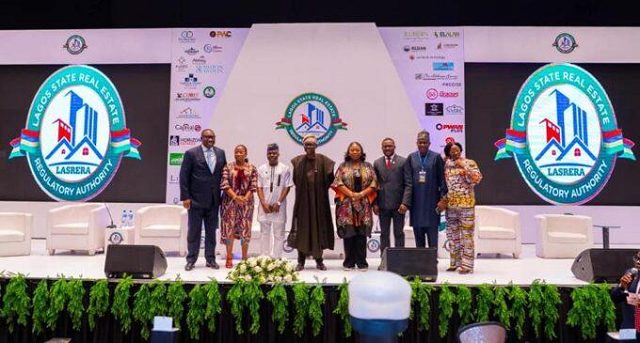The Lagos government announced that it has made a provision N5 billion to commence the state’s monthly tenancy scheme in January 2022.
This was disclosed by the Lagos State Commissioner for Finance, Rabiu Olowo, on Wednesday during a panel discussion at the Lagos real estate market place conference and exhibition, held in Lagos.
The Lagos State Real Estate Regulatory Authority (LASRERA), is hosting the two-day event, tagged, ‘Lagos: 21st Century Real Estate Investment Hub’.
The commissioner stated that the scheme was established to offer support to tenants and landlords with respect to rent remittance.
He noted that the first set of beneficiaries will be drawn from the formal sector, while the second set will be from the informal sector and others will follow accordingly.
“Following a survey, we have been able to create a model that will be launched and known as the Lagos monthly rental policy,” the commissioner said.
“The survey reveals that a large percentage of Lagos residents finds it difficult to pay their rent on yearly basis, hence the introduction of the initiative.
“You (stakeholders) have nothing to fear. You will get a better deal by joining the scheme.
“To start with, a N5 billion portfolio has been put in place to kick off the scheme.
“We welcome more support from more financial institutions to raise the bar of the portfolio for the masses to enjoy from this policy.”
The Special Adviser to the Lagos Governor on Housing, Toke Benson-Awoyinka, stated that the scheme is part of efforts to improve the real estate industry and to boost investors’ trust.
She said the scheme is synonymous with the rent-to-own scheme which is already in operation in Lagos.
According to Benson-Awoyinka, the government can dictate to landlords how they should receive rent payment from tenants.
“Yes, there is a way we can dictate, because we have the tenancy law that has prescribes that you cannot collect more than one-year tenancy in some areas of Lagos state,” NAN quoted her as saying.
“We also know that because of the credit system in Nigeria, we cannot really enforce that monthly tenancy but to create enabling environment for people to also subscribe to the scheme.
“We have put about five components together as a state government, midwifing the policy and making it seamless and easily accessible by the citizens of the state.
“If pre-qualified, we know that the tenant can afford whatever rent she or he wants to pay. But if she or he is having difficulty putting big funds together, we refer them under this scheme to the financier.
“The financier also does the needful in terms of pre-qualification and gets to know who the landlord is.
“So, there are various components to this. We have the insurance, financier, the landlord, the tenant and the legal, apart from the administrative cost of the scheme.”
She stated that there is a process for present tenants interested in joining the scheme.
“The scheme goes ahead to pay that yearly rent to the landlord but gives such a tenant an option of paying that rent on monthly basis after pre-qualification,” she added.













